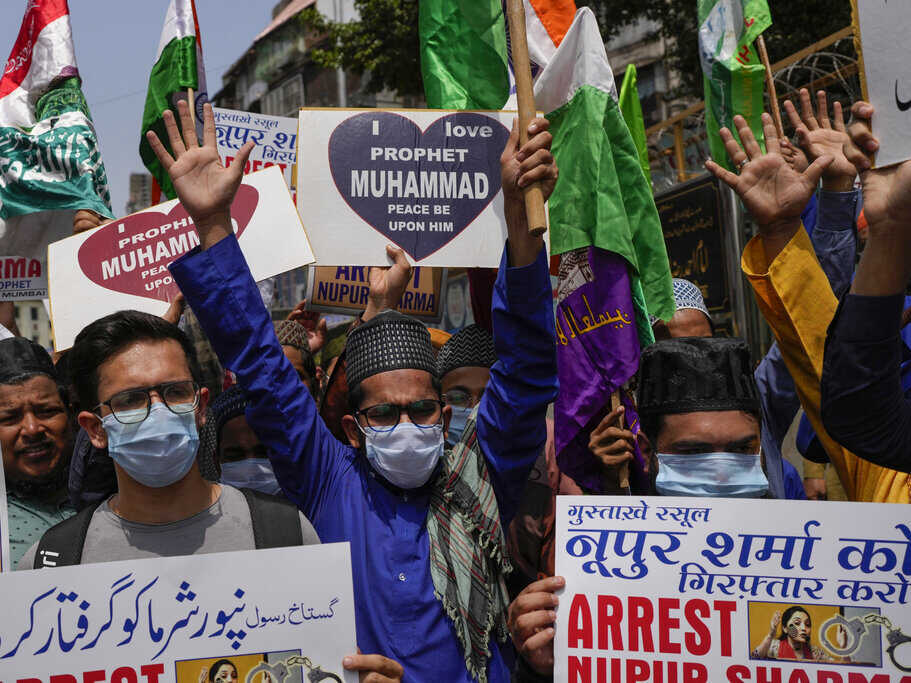Remarks on Prophet Muhammad: Sale of Indian products hit in Gulf

Several calls for the boycott of Indian products flooded social media with several hashtags critical of the Indian government and Prime Minister Narendra Modi topping the trends across many countries.
Muhammad Nihad | TwoCircles.net
NEW DELHI — The sale of Indian products in several Gulf countries took a hit amid the diplomatic row between the Gulf and Indian government after derogatory remarks against Prophet Muhammad were made by two Bharatiya Janata Party (BJP) leaders. Following strong reactions, the ruling BJP removed the leaders from the party.
Several calls for the boycott of Indian products flooded social media with several hashtags critical of the Indian government and Prime Minister Narendra Modi topping the trends across many countries.
The boycott call triggered several symbolic protests in the region. Workers of Al Ardiya Co-operative Society, a superstore in Kuwait city, were seen in a video posted by Arab News removing Indian products from their shelves and decrying the remarks as “Islamophobic.”
“Because of the insults to the Prophet, we boycotted Indian items. We, as Kuwaiti Muslims, will not tolerate insulting the Prophet,” stated Nasser Al-Mutairi, the superstore’s CEO.
https://twitter.com/arabnewspk/status/1534059236681990144?s=20&t=dnPUyxFQqQicYImJx1bcHA
Shanis Usman, an Indian businessman based in Qatar told TwoCircles.net that the repercussions will be more prevalent this time as the “issue is related to the Prophet.”
“Earlier, there have been strong responses from several diplomats and industrialists in the Gulf when Indian Muslims were targeted with violence orchestrated by Hindu right-wing in India but this time it was different,” he said.
The move to boycott Indian products came after Qatar, Kuwait, and Iran - three Gulf countries with whom India has enjoyed close connections for decades – summoned Indian envoys to express their displeasure. . Saudi Arabia, Afghanistan, and the Organization of Islamic Cooperation (OIC) also issued comments condemning the remarks. Pakistan was the next to join the front, followed by Bahrain.
Gulf accounts for majority of foreign remittances to India
The ties between India and the Gulf are built not just on trade and economics, but also on history and culture. Millions of Indians reside and work in the Gulf, which accounts for the majority of remittances to India. UAE alone hosts 89 lakh Indian citizens, which constitutes almost one-third of the total population. With time, the trade relations with these countries have only gotten stronger. Moreover, India relies heavily on the region for its oil needs. India imports a substantial amount of crude oil from Gulf countries. The country consumes 5 million barrels of oil per day, 60% of which comes from the Gulf.
On the other hand, food and grain imports are very important in the Gulf region, with over 85 percent of food and 93 percent of cereals coming from abroad. India's main exports are rice, buffalo meat, spices, seafood, fruits, vegetables, and sugar. Gulf countries rely heavily on AAE Indian flyers in their aviation industries. The emergence of global transit hubs in the Gulf, serviced by local airlines like Emirates, Etihad Airways, and Qatar Airways, has eroded the lucrative international travel market held by the US and India-based carriers.
Asheem PK, a UAE based journalist from India said that “Gulf countries are known for their cosmopolitan principles and hospitality to people from all walks of life.”
“They never discriminate against residents based on their religious beliefs, colour, or other factors. Such remarks from BJP leaders have the potential to disrupt the Indian community's peaceful living here. It's natural for an Arab, or any believer, to become enraged when someone makes inappropriate statements about the prophet whom they hold dearer than their lives. Now it is the government of India’s moral responsibility to prevent the situation from getting worse,” he told TwoCircles.net.
Muhammad Nihad PV is a sociology student at the University of Hyderabad. He tweets at @nihadbinnisar
